The water tanks aboard an RV give you the added creature comforts of hot showers and indoor bathrooms while you camp. But when there's a mishap, it can spell trouble. If your black water tank sensor is reading full when you know that it's empty, you'll need to act. Thankfully, we've been able to identify the causes and solutions for you through in-depth research.
The sensors in your black water tank can become obstructed, making it believe that the tank is full even after you have emptied it. Solving this problem will require a thorough cleaning of the tank, accomplished by adding certain chemical treatments to it.
Now that we know the causes of why your sensor is reading full, we'll take a closer look at what steps you need to take to remedy the situation. You might also be curious how you can tell if your black water tank is clogged or if you should empty it before you do your gray water tank. For the answers to these questions and more, read ahead in this post to see what we've uncovered in our research.
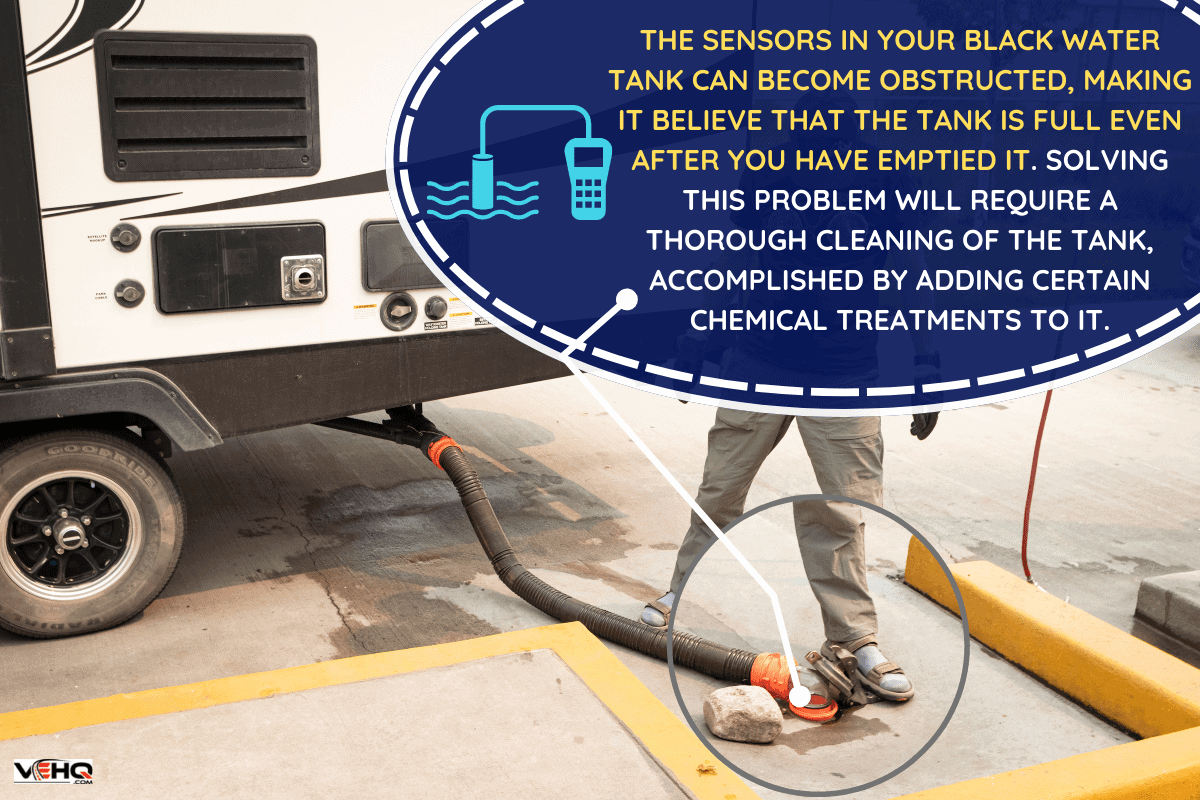
Why Your Black Water Tank Sensors Are Clogged (And What To Do About It)
If you are new to RV life, you'll learn pretty quickly that a lot of your comfort will depend on how well you treat and maintain the black and grey water tanks. A failure to maintain and clean them can mean backups, spillage, and awful odors that will permeate the inside of your home on wheels.
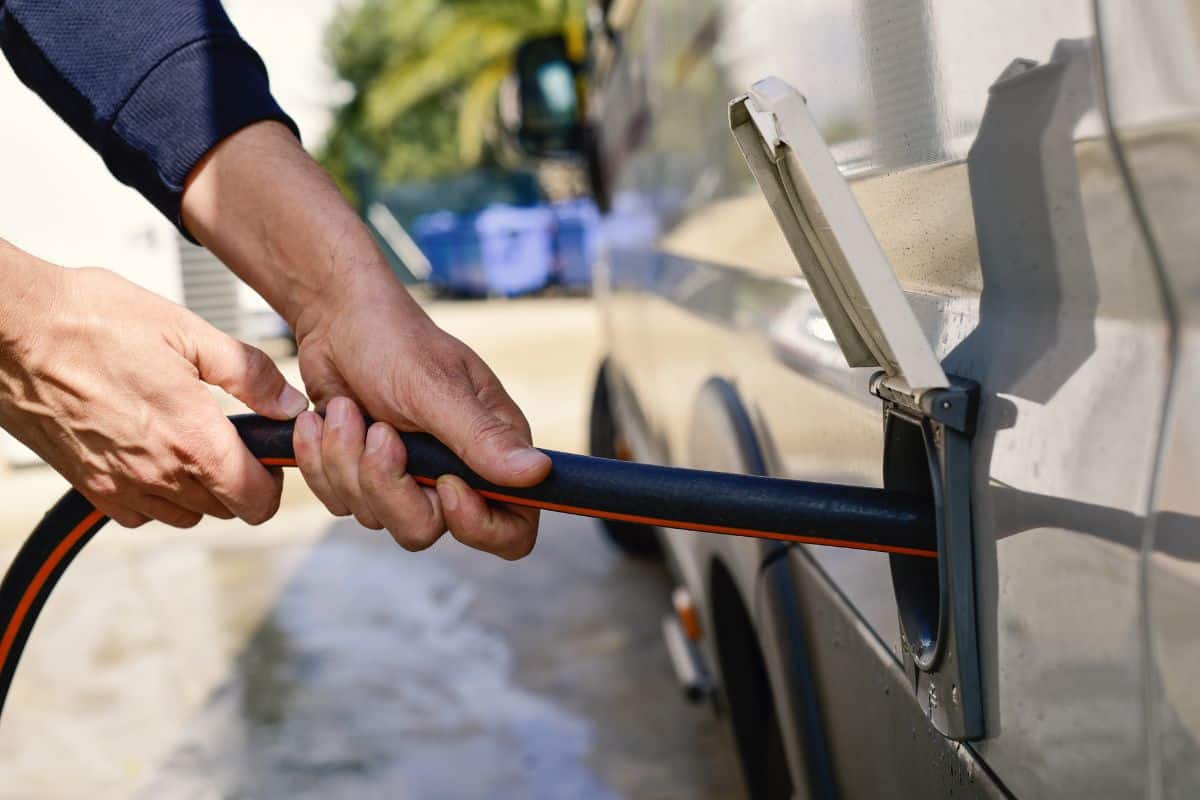
Thankfully, learning how to take care of these tanks isn't rocket science. And while there will certainly be a few tricks learned along the way, for the most part, you can keep your tanks working properly and the smells at a minimum right out of the gate.
Earlier in this post, we mentioned that obstructions will make a sensor give off incorrect readings. Let's look at the most common reasons why this happens and how to remedy the situation.
Be Careful What You Flush!
You might think that toilet paper is toilet paper. While it's true that every brand will accomplish the same thing, there are types specifically designed to be used in an RV toilet. Not using the correct form of toilet paper will have some gross consequences.
The paper you use at home works great for home sewer and septic systems. It's paper, so it will break down pretty fast.
But it will not break down fast enough for an RV black tank. The small storage tank and a minimal amount of liquid inside of them mean a lot slower breakdown. And if the paper isn't breaking down, it can clump all over the place.
One of the places that paper will clump is over the sensors. And even if you are using RV-approved toilet paper, you can still have this problem from time to time.
The solution is to treat it with a chemical, like Commando. After emptying the tank and closing the valve, flush an approved chemical cleaner down the toilet. Then, fill the tank with water.
Click here to see Commando on Amazon.
Wait 12 to 24 hours, then empty the tank again and rinse out its contents. Add the appropriate amount of water back into the black water tank with some deodorizer. Your sensors should be clear!
Use The Right Amount Of Water When You Flush
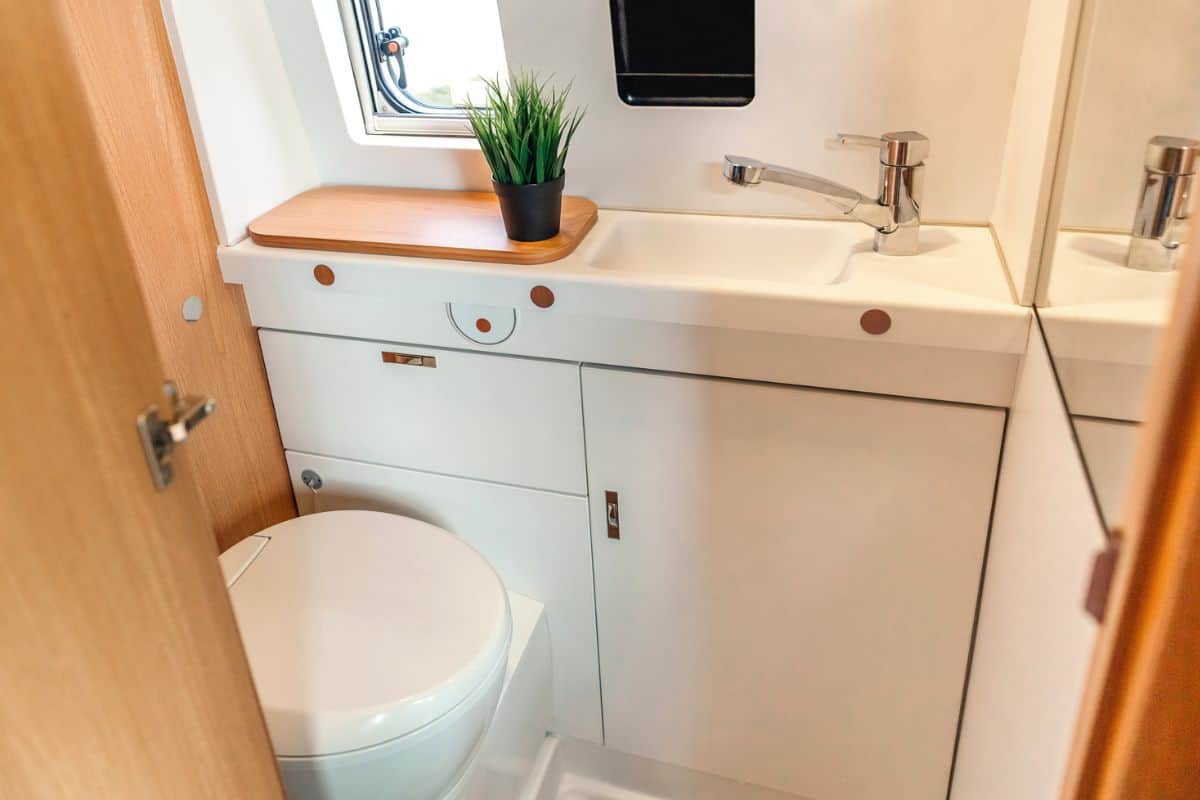
If you are not using enough water when you flush, excrement and toilet paper will have a lot easier time building up in piles in your black water tank. Having the right amount of water each time you flush will keep this from happening.
If you haven't added the right amount of water to the black water tank after you have emptied it, you won't be able to keep these clumps from building up, even if the water per flush is right.
Be sure that you start each newly cleaned black water tank out with the recommended amount of water so that you can keep this from happening
Empty And Clean The Tanks As Recommended
If you do not empty and clean the tanks as recommended, you will have debris build up over time. This will obstruct your sensors. The longer it builds up, the harder it will be to clean.
Emptying the tank before it is full is important. But equally important is rinsing it out and having it chemically treated.
Merely draining the black water tank will not remove much of the buildup that has occurred inside of it. Rinsing it out thoroughly will achieve this. The bonus of a chemical treatment afterward will eliminate any of the debris and buildup that a good rinse will have missed.
How Can You Tell If Your Black Water Tank Is Clogged?
There are two telltale signs that your black water tank is clogged, both of which are unpleasant. Identifying the cause quickly can avoid issues that will only worsen over time.
The first sign is a noxious sewer odor. This can also be indicative of the black water tank being too full. But if you notice that sewer smells are invading your RV, emptying it and washing it out should be done as soon as possible.
Sometimes a clogged black water tank will create an overflow situation. This will make seepage from the tank bank up into the RV toilet. In some cases, it will come out from beneath the toilet itself and create a mess.
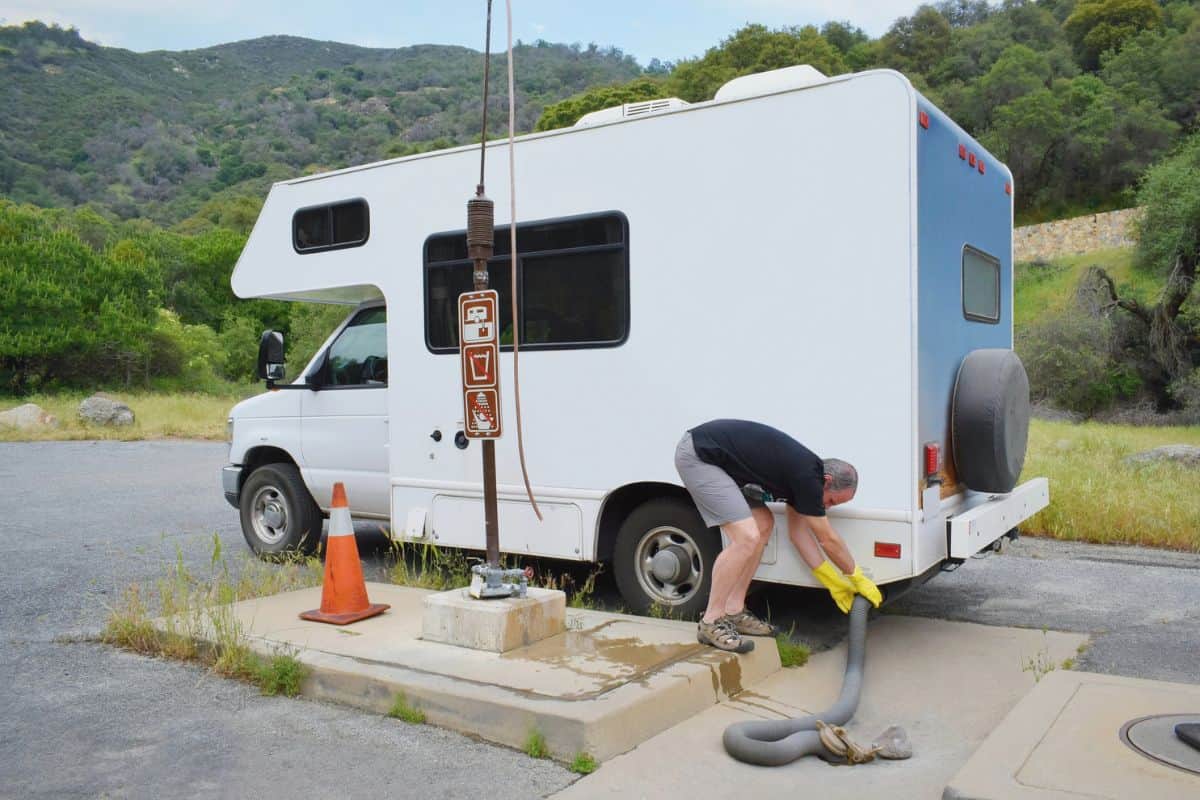
Should You Empty Your Black Water Tank First?
When you empty your RV water tanks, a certain order should be followed. Here, we'll explain why you should always empty your black water tank first.
The black water tank will empty solid waste and toilet paper through your drain hose. Not all of this waste will be carried out of it by the force of gravity from the draining liquids in the tank. By draining the black water tank first, you can get an extra, effortless rinse from draining the gray water tank second.
If you drain the gray tank first, you will have to spend more time rinsing and cleaning your drain hose when you are finished.
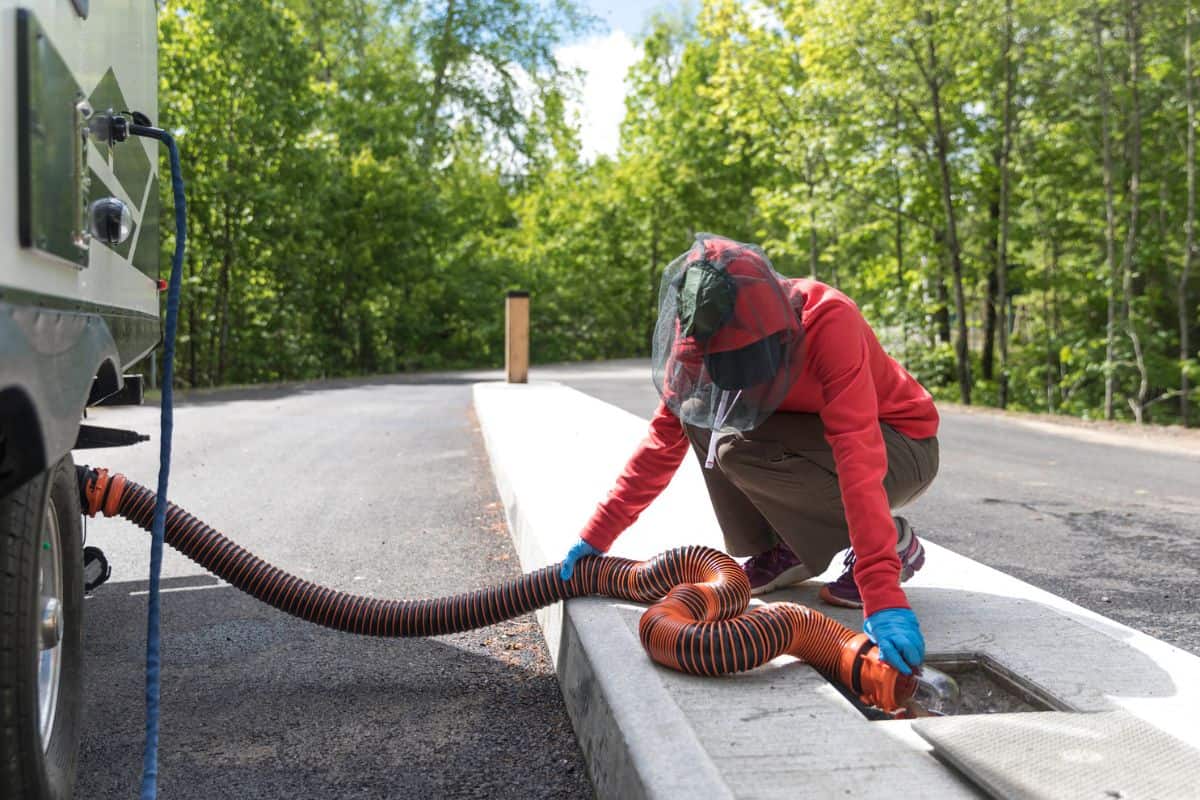
Can You Put Baking Soda In An RV Black Tank?
Baking soda is a great and inexpensive deodorizer that can be used in several ways. You might be surprised to learn that one of its uses is to help control the smell of your black water tank aboard your RV. But if you opt for baking soda, there are some things to be aware of.
It's important not to use too much of this substance, however. Overusing it will offset the acidity needed in the black water tank to break down and kill the harmful bacteria. Baking soda also tends to foam, which can lead to clogging your RV's plumbing.
Experts recommend using white vinegar instead if you are looking for a natural way to control odors in your black water tank. It won't upset the pH balance inside the tank, and will not clog any of the plumbing.
Can I Pour Bleach Down My RV Toilet?
Bleach can be a great cleaner. But you should never put it down the toilet of an RV.
The chemical makeup of bleach will damage the gaskets and seals within the RV's water tank. This can create leaks, which can be a real pain to fix. It's best to avoid bleach, even if it has been diluted.
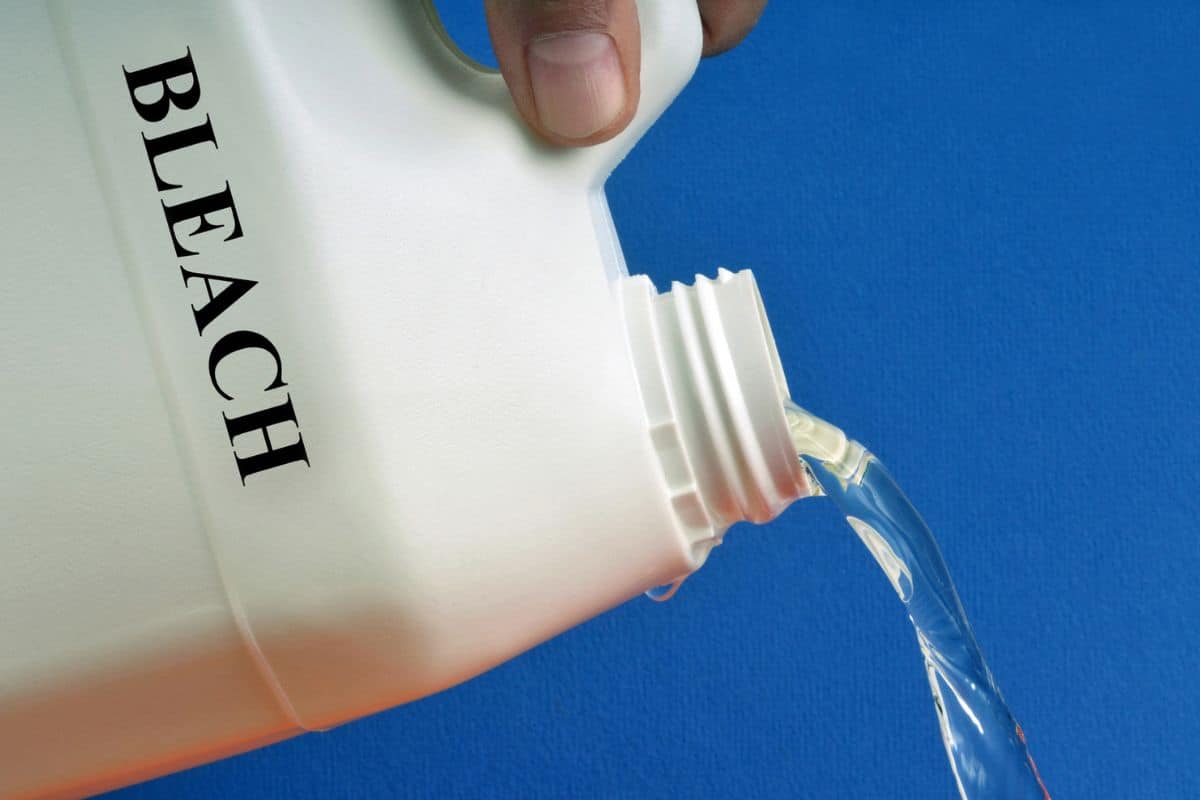
How Long Will A 40-Gallon Black Water Tank Last?
The length of time any sized black water tank will last can be a tricky one to answer. The frequency of use is the key. And how often the toilet is flushed is based on the number of people on board as well as your bathroom habits.
The less you use the toilet, the longer you can last without emptying the black water tank. Using public bathrooms on the road whenever possible will save a lot of space in the tank, which is why many RV travelers will not use their toilets unless they are camped for the night.
On average, a 40-gallon tank should last a couple of two weeks and five to seven days for a family of four. These amounts can be increased if you conserve the number of times you use the toilet onboard the RV.
Final Thoughts

Clearing the sensors will allow them to get a proper reading inside your RV's black water tank. This can be done with a simple, approved tank cleaner. Properly maintain and treat your black water tank and you shouldn't have issues with buildup that clogs the sensors too often.
We hope this post on black water tanks answered all of your questions. For additional helpful information, we suggest reading the following posts:
How Long Does A Grey Water Tank Last You Without Hookups?

